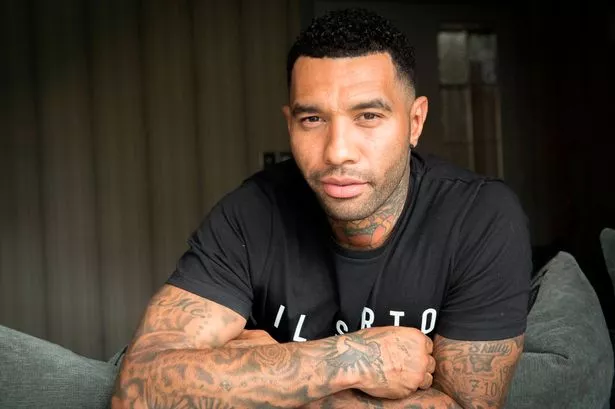News
“I had no mum, no father, multiple step-mothers and I was surrounded by drugs and crimes” – Jermaine Pennant opens up about childhood trauma

Jermaine Pennant has opened up about his childhood trauma and claims he can relate to Everton star Dele Alli after his interview with Gary Neville.
Pennant played in the Premier League for the majority of his career and represented the likes of Arsenal, Birmingham City, Liverpool and Stoke City.
Pennant has admitted to binge-drinking and addictions while battling with depression, which is something he now claims is down to his childhood trauma.
The former Champions League finalist opened up about his experiences on TalkSport. But what did Pennant say about his footballing career and why did he go to jail?
Jermaine Pennant praised Dele Alli for opening up about the trouble he faced in his life and claims he could relate to a lot of what he was saying on a personal level.
Alli spoke candidly to Gary Neville about his childhood trauma and said he was sexually assaulted at six years old. Alli went on to explain that he suffered from addiction to sleeping pills and excessive alcohol consumption.
Pennant expressed the importance of Alli’s interview and how helpful speaking up can be. He said: “When you bottle these things up it’s like a timebomb, and it will go off unexpectedly and you become very high risk of addictions. Whether it’s drugs, alcohol, gambling. Anything to take that hurt away, anything that gives you joy, you will go to.
“And now he’s spoken openly about what he went through. He can move past that trauma, past that hurt and it will not now dictate his life and his choices.”
What did Jermaine Pennant say about his childhood?
Jermaine Pennant opened up about his childhood during an interview on TalkSport.
He said: “I would go work, go training, I would put on a brave face and smile. I’d play up because there was so much trauma and darkness inside me. I was embarrassed to tell my story about what I went through and where I came from.”
Pennant went on to discuss his childhood. He explained that he was abandoned by his mother at the age of three and says he was raised by his dad, who neglected him.
Pennant said: “I would take myself to school at the age of eight, I would make my own dinner. Which was usually cornflakes. It got to a stage where my friends called me the cornflake boy as that was all I was eating.”
Pennant’s dad became a drug addict during his early teens and he added that he was surrounded by drugs and crime during his childhood.
The footballer added: “I had no mum, no father, multiple step-mothers and I was surrounded by drugs and crimes. I was also diagnosed with ADHD so as a child I was battling with that.”
Pennant claimed he never told anyone about the issues he faced and believes that it damaged his career in football.
He said: “I made bad decisions. I remember in my second year at Liverpool, I couldn’t work out why I was depressed. When things weren’t going well on the field I’d unleash it in any way possible.
“I’d want to go out, to be around people, I’d try anything as pain relief, to get drunk, binge drink, to numb the pain.”
Jermaine Pennant was a member of the Arsenal academy who emerged as an upcoming prospect after a loan spell at Leeds in 2003/04.
The prospect made 24 appearances for England’s under-21 team and signed for Birmingham City in 2004.
In 2005, the footballer was sentenced to 90 days in prison for drink driving, whilst being disqualified. He was allowed out after 30 days but was forced to wear an electronic tag.
Pennant praised former manager Steve Bruce during this period and claims he regularly visited him during his time in prison.
Advertisement
“He came to visit me in prison. Not to talk about Birmingham. To come to see me, as a person, as a young man, to see how I was doing and my health.
“It was weird because everyone knew who he was. Everyone was looking around in the meeting room but that meant a lot.”
He added: “Most managers that I have had have thrown me away, ‘go and train with the kids’, never had a conversation where they’d ask me if I was alright in the head, everything okay at home?”
Pennant retired from football in 2018 and he now works as a pundit for TalkSport. He says he has turned his life around and credits this to therapy which gave the help that he needed.

-

 News2 days ago
News2 days agoMichael Carrick Explains Mason Mount Absence In Manchester United Win Over Fulham
-

 Uncategorized1 day ago
Uncategorized1 day agoElliot Lee Takes Subtle Swipe At Phil Parkinson After Wrexham Exit
-

 Premier League2 days ago
Premier League2 days agoLiverpool Stun Chelsea With £60m Jeremy Jacquet Transfer Twist
-

 Premier League2 days ago
Premier League2 days agoCan Arsenal Recall Ethan Nwaneri? Why the Gunners Can’t Bring Him Back After Merino Injury
-

 More Sports1 day ago
More Sports1 day agoSix Nations Shake-Up: Why The New Six-Week Format Could Change Everything
-

 Local News2 days ago
Local News2 days ago“Very, Very Happy”: Ademola Lookman Speaks As Atletico Madrid Player
-

 News1 day ago
News1 day agoEnzo Fernandez Sends Emotional Message Of Support To Chelsea Starlet Estevao
-

 Transfers9 hours ago
Transfers9 hours agoKanté Terminates Al-Ittihad Contract To Seal Fenerbahce Move As Ex-Chelsea Star Returns To Europe
























